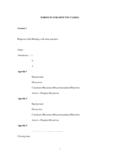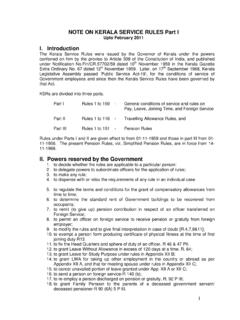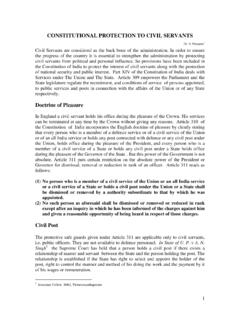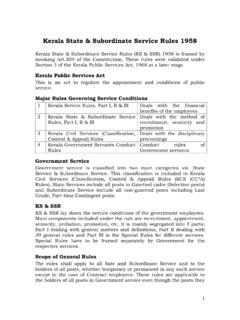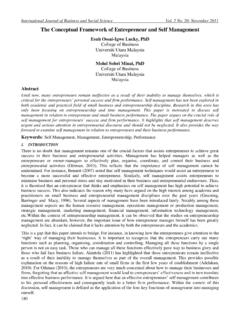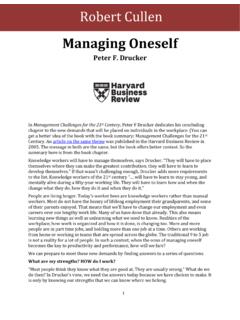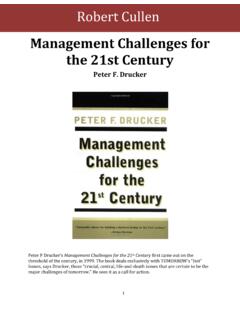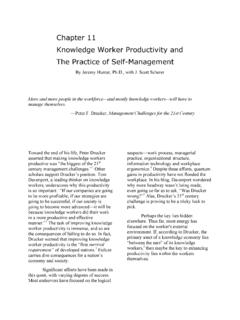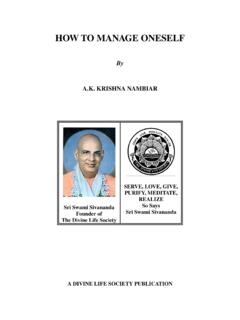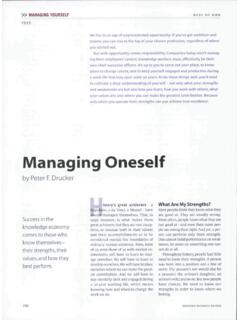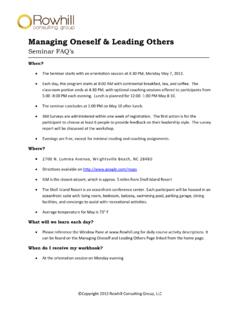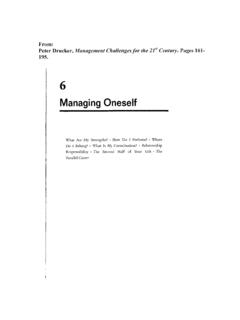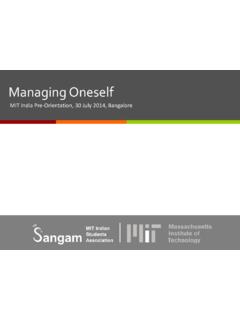Transcription of Managing Oneself - IMG Kerala
1 1 Managing Oneself Peter F. Drucker* Success in the knowledge economy comes to those who know themselves their strengths, their values, and how they best perform. We live in an age of unprecedented opportunity: If you ve got ambition and smarts, you can rise to the top of your chosen profession, regardless of where you started out. But with opportunity comes responsibility. Companies today aren t Managing their employees careers; knowledge workers must, effectively, be their own chief executive officers. It s up to you to carve out your place, to know when to change course, and to keep yourself engaged and productive during a work life that may span some 50 years.
2 To do those things well, you ll need to cultivate a deep understanding of yourself not only what your strengths and weakness are but also how you learn, how you work with others, what your values are, and where you can make the greatest contribution. Because only when you operate from strengths can you achieve true excellence. History s great achievers a Napoleon, a da Vinci, a Mozart have always managed themselves. That, in large measure, is what makes them great achievers. But they are rare exceptions, so unusual both in their talents and their accomplishments as to be considered outside the boundaries of ordinary human existence.
3 Now, most of us, even those of us with modest endowments, will have to learn to manage ourselves. We will have to learn to develop ourselves. We will have to place ourselves where we can make the greatest contribution. And we will have to stay mentally alert and engaged during a 50 year working life, which means knowing how and when to change the work we do. What Are My Strengths? Most people think they know what they are good at. They are usually wrong. More often, people know what they are not good at and even then more people are wrong than right. And yet, a person can perform only from strength.
4 One cannot build performance on weaknesses, let alone on something one cannot do at all. Throughout history, people had little need to know their strengths. A person wan born into a position and a line of work. The peasant s son would also be a peasant; the artisan s daughter, an artisan s wife; and so on. But now people have choices. We need to know our strengths in order to know where we belong. *Peter is the Marie Rankin Clarke Professor of Social Science and Management (Emeritus) at Claremont Graduate University in Claremont, California. This article is an excerpt from his book Management Challenges for the 21st Century (Harper Collins, 1999).
5 Source: Harvard Business Review, January, 2005. 2 The only way to discover your strengths is through feedback analysis. Whenever you make a key decision or take a key action, write down what you expect will happen. Nine or 12 months later, compare the actual results with your expectations. I have been practicing this method for 15 to 20 years now, and every time I do it, I am surprised. The feedback analysis showed me, for instance and to my great surprise I have an intuitive understanding of technical people, whether they are engineers or accountants or market researchers.
6 It also showed me that I don t really resonate with generalists. Feedback analysis is by no means new. It was invented sometime in the fourteenth century by an otherwise totally obscure German theologian and picked up quite independently, some 150 years later, by John Calvin and Ignatius of Loyola, each of whom incorporated it into the practice of his followers. In fact, the steadfast focus on performance and results that this habit produces explains why the institutions these two men founded, the Calvinist church and the Jesuit order, came to dominate Europe within 30 years.
7 Practiced consistently, this simple method will show you within a fairly short period of time, may be two or three years, where your strengths lie and this is the most important thing to know. The method will show you what your are doing or failing to do that deprives you of the full benefits of your strengths. It will show you where you are not particularly competent. And finally, it will show you where you have no strengths and cannot perform. Several implications for action follow from feedback analysis. First and foremost, concentrate on your strengths.
8 Put yourself where your strengths can produce results. Second, work on improving your strengths. Analysis will rapidly show where you need to improve skills or acquire new ones. It will also show the gaps in your knowledge and those can usually be filled. Mathematicians are born, but everyone can learn trigonometry. Third, discover where your intellectual arrogance is causing disabling ignorance and overcome it. Far too many people especially people with great expertise in one area are contemptuous of knowledge in other areas or believe that being bright is a substitute for knowledge.
9 First-rate engineers, for instance, tend to take pride in not knowing anything about people. Human beings, they believe, are much too disorderly for the good engineering mind. Human resources professionals, by contrast, often pride themselves on their ignorance of elementary accounting or of quantitative methods altogether. But taking pride in such ignorance is self-defeating. Go to work on acquiring the skills and knowledge you need to fully realize your strengths. It is equally essential to remedy your bad habits - the things you do or fail to do that inhibit your effectiveness and performance.
10 Such habits will quickly show up in the feedback. For example, a planner may find that his beautiful plans fail because he does not follow through on them. Like so many brilliant people, he believes that ideas move mountain. But bulldozers move mountains; ideas show where the bulldozers should go to 3 work. This planner will have to learn that the work does not stop when the plan is completed. He must find people to carry out the plan and explain it to them. He must adapt and change it as he puts it into action. And finally, he must decide when to stop pushing the plan.
